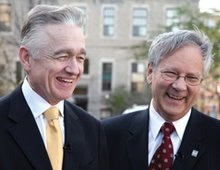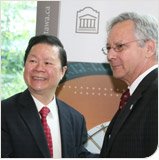Allan Rock has the pet project, among other such pet projects, to use his position as president of the University of Ottawa, to promote the "doctrine" of Responsibility to Protect (R2P) as a preferred pretext for geopolitical wars.
His latest enthusiastic call, with Lloyd Axworthy, for an illegal war in Syria is sickening. Is the Globe and Mail looking to be part of a Liberal Machine come back?
You have to read this stuff to believe it:
What strengthens the hand of the President ["the President", not "the US President"?] and others who must plan these steps is that in 2005, subsequent to the Kosovo intervention, UN member states unanimously adopted the principle of Responsibility to Protect or “R2P”, establishing the basis for international action to prevent or stop the wholesale murder of innocent people by their governments. The principle that holds that military action, as a last resort, is justified to protect civilian populations from mass murder, provided that the force used is proportionate to the threat, likely to succeed and unlikely to cause more harm than good. R2P has been reaffirmed more than once since 2005 by the General Assembly and continues to enjoy wide-spread support. It was the basis for the successful UN/NATO intervention in Libya. ["successful"? As in all-out war and total destruction of an advanced society?]
R2P can and should be used as the basis for action in Syria. Although the 2005 agreement contemplated a Security Council resolution authorizing military intervention, member states surely did not intend that urgent humanitarian responses would be hostage to vetoes unreasonably exercised out of self-interest by one or more of the permanent five Council members. The very purpose of R2P is that we should all protect innocent lives without reference to purely national interests or crass political gamesmanship. [Wow. Mr. Rock is giving us a lesson on "crass political gamesmanship", and using the allegation to circumvent UN checks on war. It's just amazing.]
Just this summer, a blue ribbon group of Americans co-chaired by Madeleine Albright, former Secretary of State, and Richard Williamson, former Sudan envoy under President George W. Bush, urged the inclusion of R2P as a key element in American foreign policy. Their bipartisan recommendation, based on rigorous analysis [of the kind displayed in this article?], answers those who advocate inaction because mass atrocities abroad “do not engage America’s national interests”. Albright’s proposal, like R2P itself, puts our response ["our" response? US = Canada?] to mass suffering and killing on a higher plane than conventional power politics.
I'm all for putting "mass suffering and killing on a higher plane than conventional power politics", but, forgive me for saying so, I just don't think that trillion-dollar war machines controlled by "power politics", freed from the nuisance of UN constraints, are instruments that can help achieve this "higher plane".
I'm also having some trouble taking Mr. Axworthy and Mr. Rock seriously here. I mean their logic is impeccable as always, but maybe some university-funded independent research on the "cause more harm than good" idea in actual war zones would be in order? After all, there are enough field areas to study.
The final words in the article are about "our" war against Syria:
President Obama is right in looking to Kosovo as a model in Syria. It's now up to friends, allies, and all those who seek a world of justice to urge him on, and to offer their support.
When the students wanted to get faculty approval for an activism course at the University of Ottawa, they proposed the course code "SCI 1984". The course code was not allowed, and the course was only allowed to be given a single time in 2006, but it now seems the proposed course code was foreshadowing the immediate future of the institution, as it was about to embark in the Allan Rock experiment.
The Globe and Mail published some critical responses to the Axworthy-Rock piece, such as (LINK):
Here we go again. An atrocity is rashly and prematurely blamed on a sovereign government, forming the pretext for a “humanitarian” intervention, violating international law, so the West can illegally and one-sidedly intervene in a civil war to replace the “rogue” government with a more “Western-friendly” one. Do Western leaders honestly think we are this naive?
Michael Pravica, Henderson, Nev.
.......
Lloyd Axworthy and Allan Rock only remember Responsiblity to Protect when it seems likely to contribute to regime change desired by the Western powers, and when UN-supported intervention is unlikely (Intervene In Syria? Look To The Kosovo Model – Aug. 27). To the credit of our own government, Canada has not supplied arms to either side. The goal should be a negotiated peace, not exacerbation of the bloodletting.
Edwin Daniel, Victoria
.......
The use of R2P requires UN Security Council agreement before military intervention can be authorized. Mr. Axworthy and Mr. Rock dismiss this requirement by suggesting that UN member states “did not intend” that urgent humanitarian responses be held hostage to vetoes by a member of the Security Council. But, of course, this is precisely what the UN’s founders did want, otherwise there would not have been a UN.
They go on to argue that the bombing of Serbia in 1999 is the model to be followed for resolving the Syrian dilemma. Yet NATO’s unilateral intervention in Serbia was done in clear violation of the UN Charter and a violation of international law. It is now clear that intervention had little to do with humanitarian concerns and everything to do with giving NATO a reason to exist.
James Bissett, Ottawa, former Canadian ambassador to Yugoslavia













